IT Ethics: The Ethics of Driverless Trucks in the Australian Context
VerifiedAdded on 2021/06/17
|9
|1776
|41
Essay
AI Summary
This essay delves into the ethical implications of driverless trucks in Australia, focusing on the potential for widespread job displacement within the trucking industry and related businesses. The author analyzes the situation through the lens of four classical ethical theories: utilitarianism, deontology, virtue ethics, and contract theory. The analysis highlights how the implementation of driverless trucks could lead to significant job losses, affecting not only truck drivers but also associated businesses like roadside services. Based on the application of these ethical frameworks, the essay concludes that the widespread adoption of driverless trucks is unethical due to the negative consequences for a large number of people, despite potential economic benefits. The essay also includes a detailed ethical framework analysis to understand the core issues, facts, stakeholders, and potential solutions related to the adoption of driverless trucks in Australia.
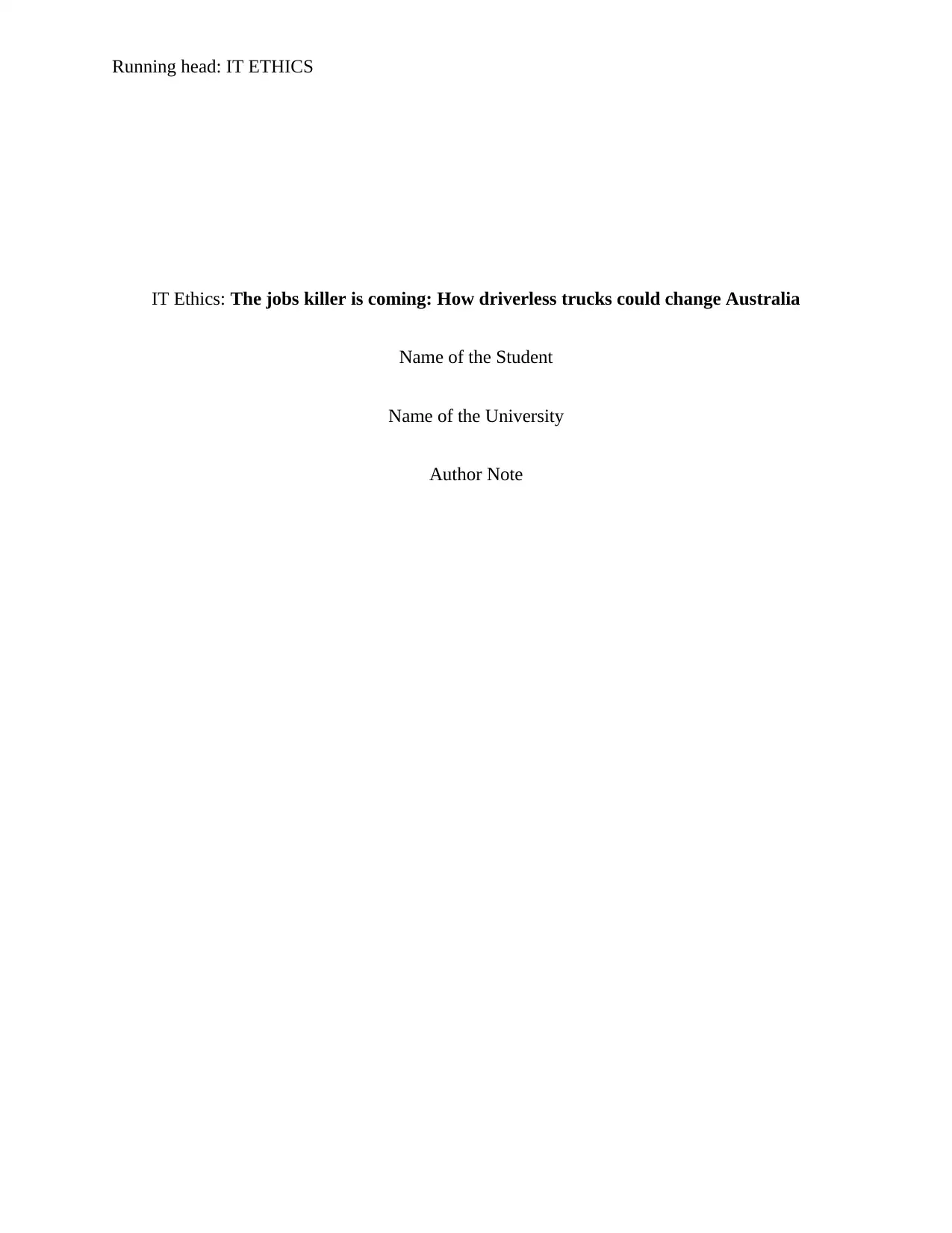
Running head: IT ETHICS
IT Ethics: The jobs killer is coming: How driverless trucks could change Australia
Name of the Student
Name of the University
Author Note
IT Ethics: The jobs killer is coming: How driverless trucks could change Australia
Name of the Student
Name of the University
Author Note
Paraphrase This Document
Need a fresh take? Get an instant paraphrase of this document with our AI Paraphraser
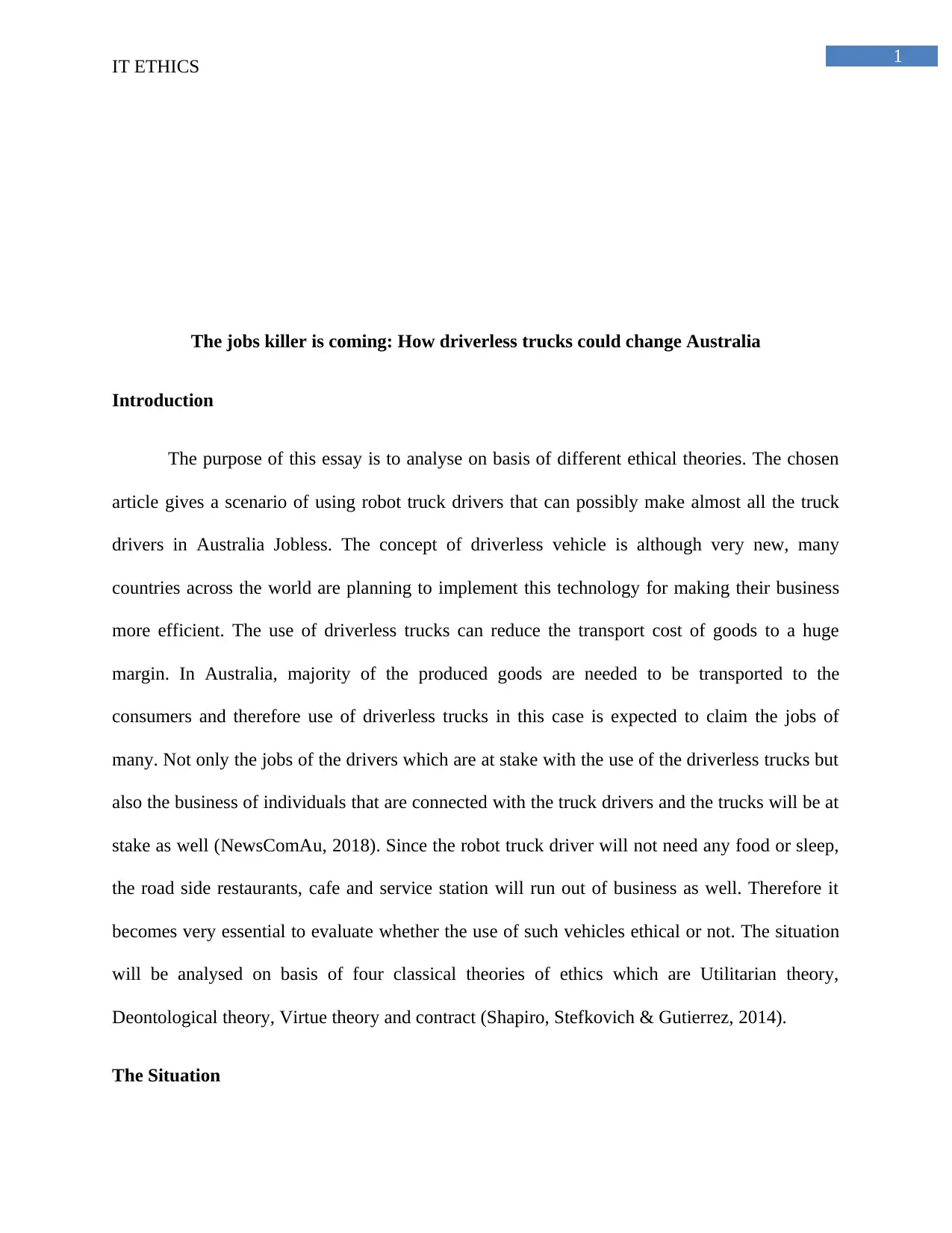
1
IT ETHICS
The jobs killer is coming: How driverless trucks could change Australia
Introduction
The purpose of this essay is to analyse on basis of different ethical theories. The chosen
article gives a scenario of using robot truck drivers that can possibly make almost all the truck
drivers in Australia Jobless. The concept of driverless vehicle is although very new, many
countries across the world are planning to implement this technology for making their business
more efficient. The use of driverless trucks can reduce the transport cost of goods to a huge
margin. In Australia, majority of the produced goods are needed to be transported to the
consumers and therefore use of driverless trucks in this case is expected to claim the jobs of
many. Not only the jobs of the drivers which are at stake with the use of the driverless trucks but
also the business of individuals that are connected with the truck drivers and the trucks will be at
stake as well (NewsComAu, 2018). Since the robot truck driver will not need any food or sleep,
the road side restaurants, cafe and service station will run out of business as well. Therefore it
becomes very essential to evaluate whether the use of such vehicles ethical or not. The situation
will be analysed on basis of four classical theories of ethics which are Utilitarian theory,
Deontological theory, Virtue theory and contract (Shapiro, Stefkovich & Gutierrez, 2014).
The Situation
IT ETHICS
The jobs killer is coming: How driverless trucks could change Australia
Introduction
The purpose of this essay is to analyse on basis of different ethical theories. The chosen
article gives a scenario of using robot truck drivers that can possibly make almost all the truck
drivers in Australia Jobless. The concept of driverless vehicle is although very new, many
countries across the world are planning to implement this technology for making their business
more efficient. The use of driverless trucks can reduce the transport cost of goods to a huge
margin. In Australia, majority of the produced goods are needed to be transported to the
consumers and therefore use of driverless trucks in this case is expected to claim the jobs of
many. Not only the jobs of the drivers which are at stake with the use of the driverless trucks but
also the business of individuals that are connected with the truck drivers and the trucks will be at
stake as well (NewsComAu, 2018). Since the robot truck driver will not need any food or sleep,
the road side restaurants, cafe and service station will run out of business as well. Therefore it
becomes very essential to evaluate whether the use of such vehicles ethical or not. The situation
will be analysed on basis of four classical theories of ethics which are Utilitarian theory,
Deontological theory, Virtue theory and contract (Shapiro, Stefkovich & Gutierrez, 2014).
The Situation
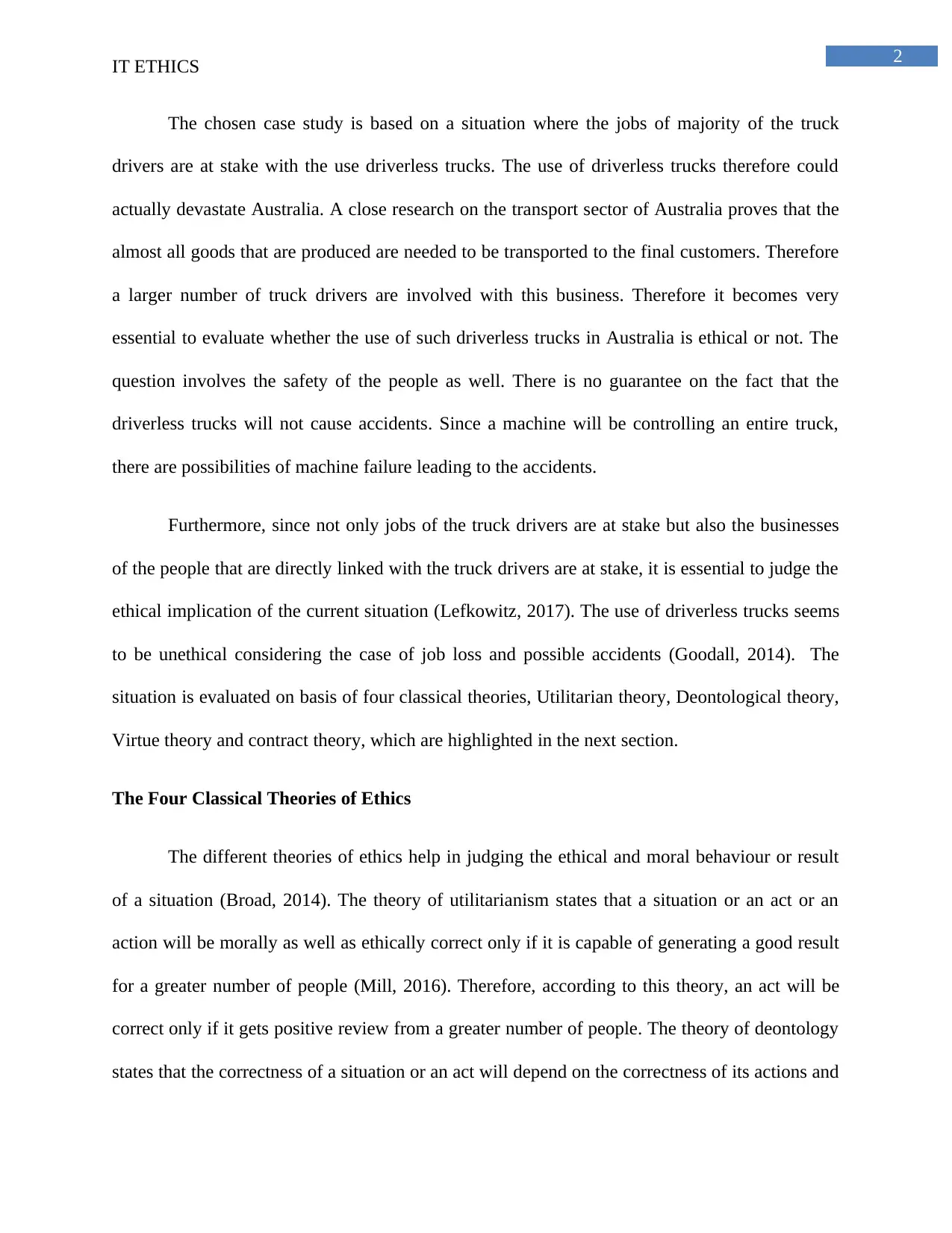
2
IT ETHICS
The chosen case study is based on a situation where the jobs of majority of the truck
drivers are at stake with the use driverless trucks. The use of driverless trucks therefore could
actually devastate Australia. A close research on the transport sector of Australia proves that the
almost all goods that are produced are needed to be transported to the final customers. Therefore
a larger number of truck drivers are involved with this business. Therefore it becomes very
essential to evaluate whether the use of such driverless trucks in Australia is ethical or not. The
question involves the safety of the people as well. There is no guarantee on the fact that the
driverless trucks will not cause accidents. Since a machine will be controlling an entire truck,
there are possibilities of machine failure leading to the accidents.
Furthermore, since not only jobs of the truck drivers are at stake but also the businesses
of the people that are directly linked with the truck drivers are at stake, it is essential to judge the
ethical implication of the current situation (Lefkowitz, 2017). The use of driverless trucks seems
to be unethical considering the case of job loss and possible accidents (Goodall, 2014). The
situation is evaluated on basis of four classical theories, Utilitarian theory, Deontological theory,
Virtue theory and contract theory, which are highlighted in the next section.
The Four Classical Theories of Ethics
The different theories of ethics help in judging the ethical and moral behaviour or result
of a situation (Broad, 2014). The theory of utilitarianism states that a situation or an act or an
action will be morally as well as ethically correct only if it is capable of generating a good result
for a greater number of people (Mill, 2016). Therefore, according to this theory, an act will be
correct only if it gets positive review from a greater number of people. The theory of deontology
states that the correctness of a situation or an act will depend on the correctness of its actions and
IT ETHICS
The chosen case study is based on a situation where the jobs of majority of the truck
drivers are at stake with the use driverless trucks. The use of driverless trucks therefore could
actually devastate Australia. A close research on the transport sector of Australia proves that the
almost all goods that are produced are needed to be transported to the final customers. Therefore
a larger number of truck drivers are involved with this business. Therefore it becomes very
essential to evaluate whether the use of such driverless trucks in Australia is ethical or not. The
question involves the safety of the people as well. There is no guarantee on the fact that the
driverless trucks will not cause accidents. Since a machine will be controlling an entire truck,
there are possibilities of machine failure leading to the accidents.
Furthermore, since not only jobs of the truck drivers are at stake but also the businesses
of the people that are directly linked with the truck drivers are at stake, it is essential to judge the
ethical implication of the current situation (Lefkowitz, 2017). The use of driverless trucks seems
to be unethical considering the case of job loss and possible accidents (Goodall, 2014). The
situation is evaluated on basis of four classical theories, Utilitarian theory, Deontological theory,
Virtue theory and contract theory, which are highlighted in the next section.
The Four Classical Theories of Ethics
The different theories of ethics help in judging the ethical and moral behaviour or result
of a situation (Broad, 2014). The theory of utilitarianism states that a situation or an act or an
action will be morally as well as ethically correct only if it is capable of generating a good result
for a greater number of people (Mill, 2016). Therefore, according to this theory, an act will be
correct only if it gets positive review from a greater number of people. The theory of deontology
states that the correctness of a situation or an act will depend on the correctness of its actions and
⊘ This is a preview!⊘
Do you want full access?
Subscribe today to unlock all pages.

Trusted by 1+ million students worldwide
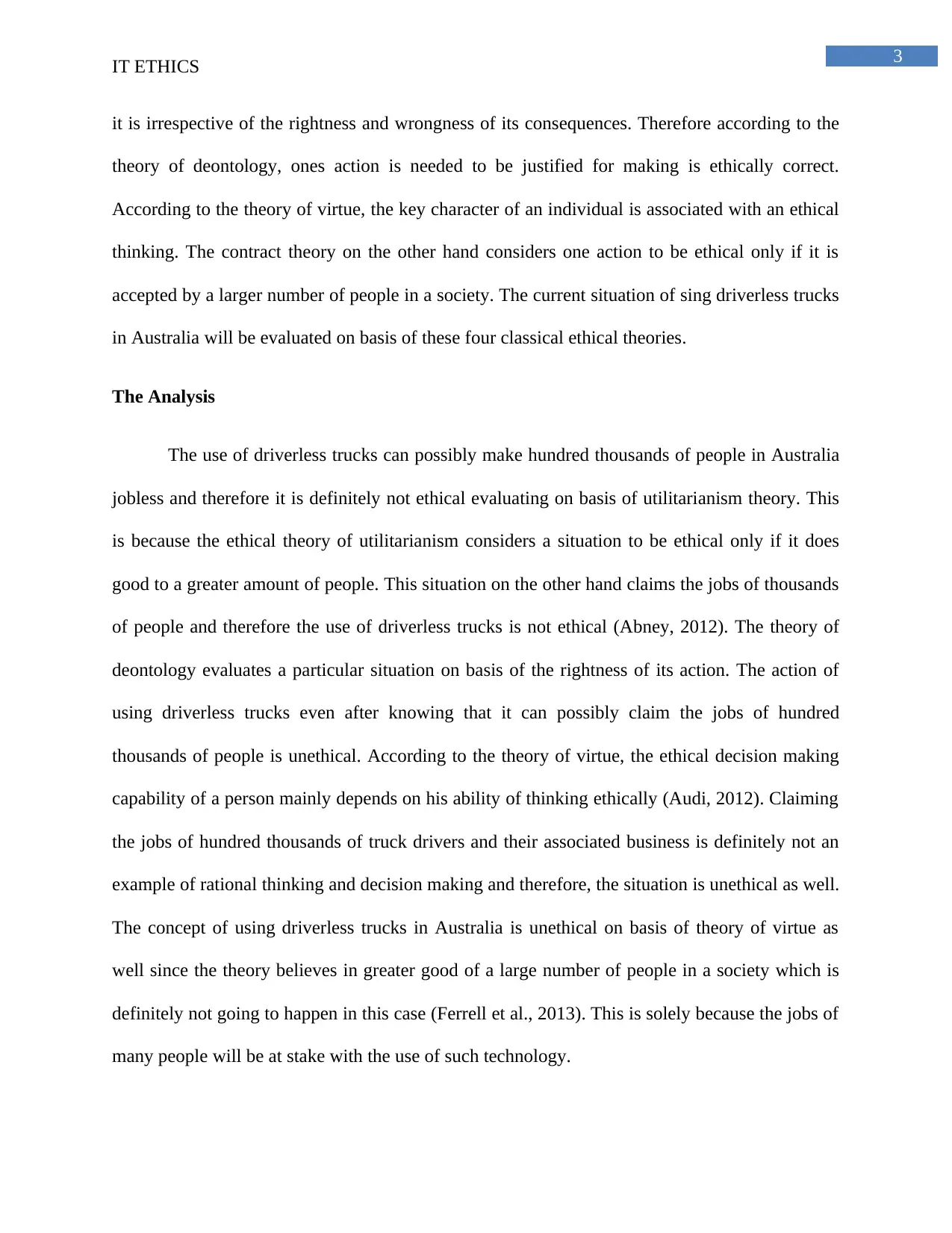
3
IT ETHICS
it is irrespective of the rightness and wrongness of its consequences. Therefore according to the
theory of deontology, ones action is needed to be justified for making is ethically correct.
According to the theory of virtue, the key character of an individual is associated with an ethical
thinking. The contract theory on the other hand considers one action to be ethical only if it is
accepted by a larger number of people in a society. The current situation of sing driverless trucks
in Australia will be evaluated on basis of these four classical ethical theories.
The Analysis
The use of driverless trucks can possibly make hundred thousands of people in Australia
jobless and therefore it is definitely not ethical evaluating on basis of utilitarianism theory. This
is because the ethical theory of utilitarianism considers a situation to be ethical only if it does
good to a greater amount of people. This situation on the other hand claims the jobs of thousands
of people and therefore the use of driverless trucks is not ethical (Abney, 2012). The theory of
deontology evaluates a particular situation on basis of the rightness of its action. The action of
using driverless trucks even after knowing that it can possibly claim the jobs of hundred
thousands of people is unethical. According to the theory of virtue, the ethical decision making
capability of a person mainly depends on his ability of thinking ethically (Audi, 2012). Claiming
the jobs of hundred thousands of truck drivers and their associated business is definitely not an
example of rational thinking and decision making and therefore, the situation is unethical as well.
The concept of using driverless trucks in Australia is unethical on basis of theory of virtue as
well since the theory believes in greater good of a large number of people in a society which is
definitely not going to happen in this case (Ferrell et al., 2013). This is solely because the jobs of
many people will be at stake with the use of such technology.
IT ETHICS
it is irrespective of the rightness and wrongness of its consequences. Therefore according to the
theory of deontology, ones action is needed to be justified for making is ethically correct.
According to the theory of virtue, the key character of an individual is associated with an ethical
thinking. The contract theory on the other hand considers one action to be ethical only if it is
accepted by a larger number of people in a society. The current situation of sing driverless trucks
in Australia will be evaluated on basis of these four classical ethical theories.
The Analysis
The use of driverless trucks can possibly make hundred thousands of people in Australia
jobless and therefore it is definitely not ethical evaluating on basis of utilitarianism theory. This
is because the ethical theory of utilitarianism considers a situation to be ethical only if it does
good to a greater amount of people. This situation on the other hand claims the jobs of thousands
of people and therefore the use of driverless trucks is not ethical (Abney, 2012). The theory of
deontology evaluates a particular situation on basis of the rightness of its action. The action of
using driverless trucks even after knowing that it can possibly claim the jobs of hundred
thousands of people is unethical. According to the theory of virtue, the ethical decision making
capability of a person mainly depends on his ability of thinking ethically (Audi, 2012). Claiming
the jobs of hundred thousands of truck drivers and their associated business is definitely not an
example of rational thinking and decision making and therefore, the situation is unethical as well.
The concept of using driverless trucks in Australia is unethical on basis of theory of virtue as
well since the theory believes in greater good of a large number of people in a society which is
definitely not going to happen in this case (Ferrell et al., 2013). This is solely because the jobs of
many people will be at stake with the use of such technology.
Paraphrase This Document
Need a fresh take? Get an instant paraphrase of this document with our AI Paraphraser
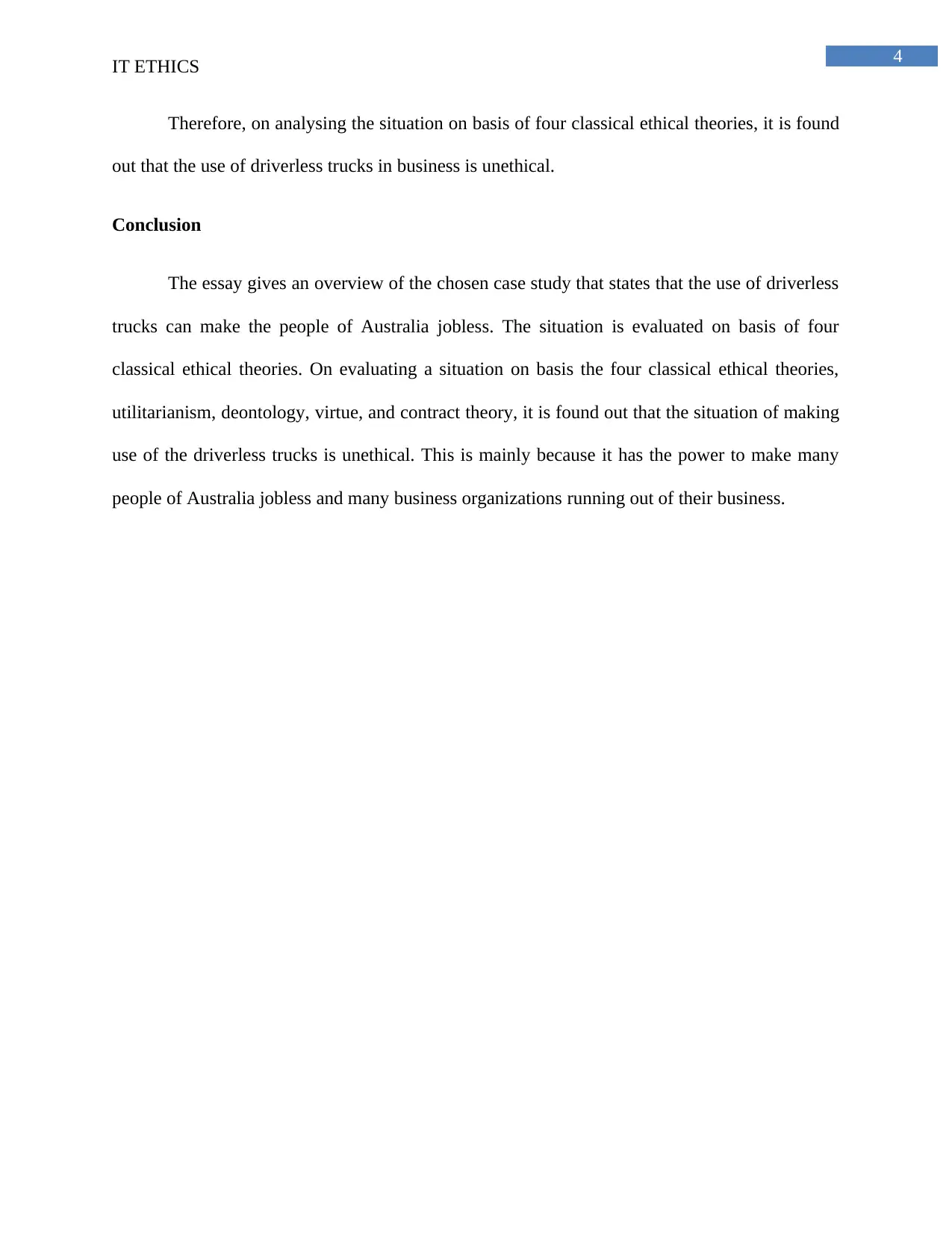
4
IT ETHICS
Therefore, on analysing the situation on basis of four classical ethical theories, it is found
out that the use of driverless trucks in business is unethical.
Conclusion
The essay gives an overview of the chosen case study that states that the use of driverless
trucks can make the people of Australia jobless. The situation is evaluated on basis of four
classical ethical theories. On evaluating a situation on basis the four classical ethical theories,
utilitarianism, deontology, virtue, and contract theory, it is found out that the situation of making
use of the driverless trucks is unethical. This is mainly because it has the power to make many
people of Australia jobless and many business organizations running out of their business.
IT ETHICS
Therefore, on analysing the situation on basis of four classical ethical theories, it is found
out that the use of driverless trucks in business is unethical.
Conclusion
The essay gives an overview of the chosen case study that states that the use of driverless
trucks can make the people of Australia jobless. The situation is evaluated on basis of four
classical ethical theories. On evaluating a situation on basis the four classical ethical theories,
utilitarianism, deontology, virtue, and contract theory, it is found out that the situation of making
use of the driverless trucks is unethical. This is mainly because it has the power to make many
people of Australia jobless and many business organizations running out of their business.
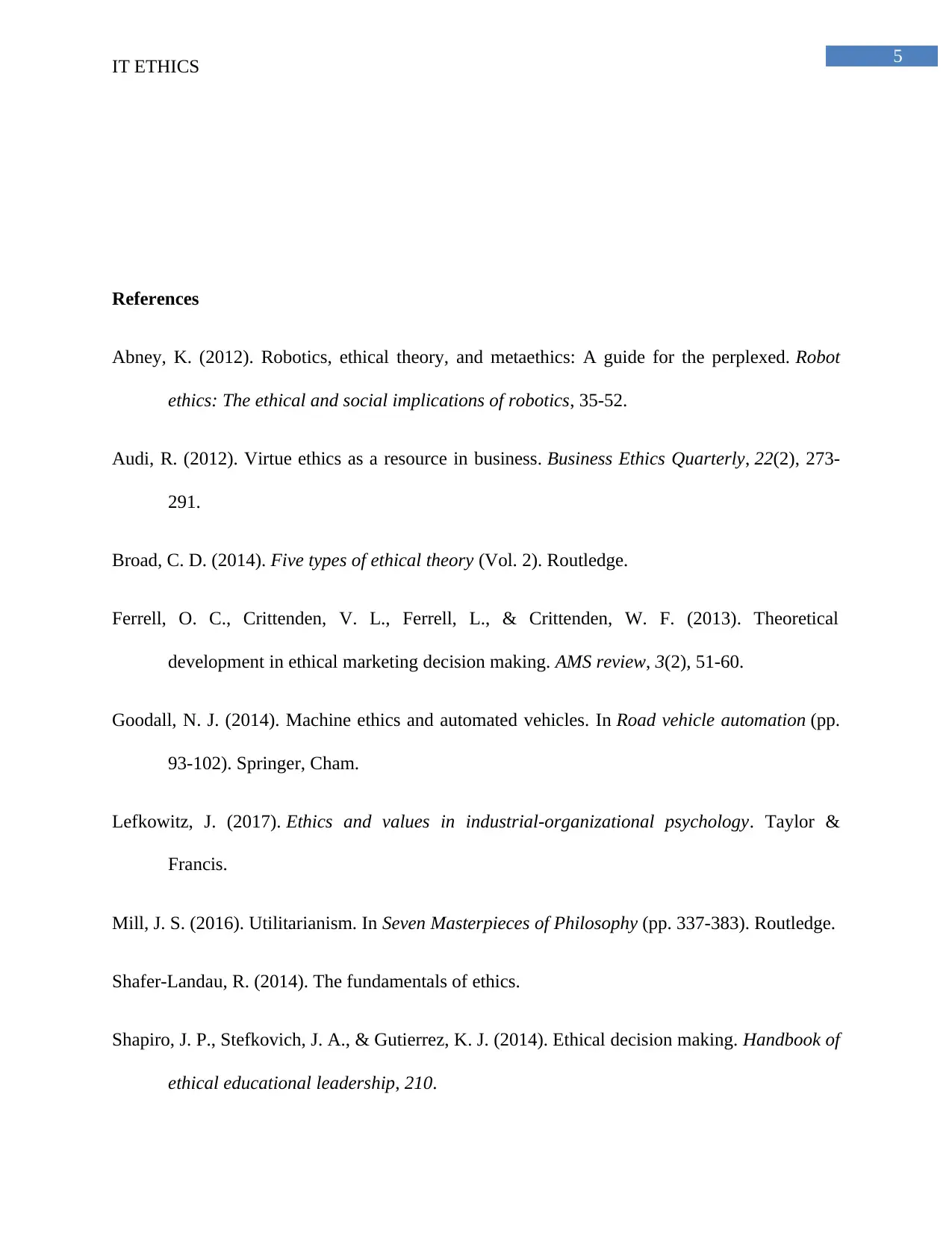
5
IT ETHICS
References
Abney, K. (2012). Robotics, ethical theory, and metaethics: A guide for the perplexed. Robot
ethics: The ethical and social implications of robotics, 35-52.
Audi, R. (2012). Virtue ethics as a resource in business. Business Ethics Quarterly, 22(2), 273-
291.
Broad, C. D. (2014). Five types of ethical theory (Vol. 2). Routledge.
Ferrell, O. C., Crittenden, V. L., Ferrell, L., & Crittenden, W. F. (2013). Theoretical
development in ethical marketing decision making. AMS review, 3(2), 51-60.
Goodall, N. J. (2014). Machine ethics and automated vehicles. In Road vehicle automation (pp.
93-102). Springer, Cham.
Lefkowitz, J. (2017). Ethics and values in industrial-organizational psychology. Taylor &
Francis.
Mill, J. S. (2016). Utilitarianism. In Seven Masterpieces of Philosophy (pp. 337-383). Routledge.
Shafer-Landau, R. (2014). The fundamentals of ethics.
Shapiro, J. P., Stefkovich, J. A., & Gutierrez, K. J. (2014). Ethical decision making. Handbook of
ethical educational leadership, 210.
IT ETHICS
References
Abney, K. (2012). Robotics, ethical theory, and metaethics: A guide for the perplexed. Robot
ethics: The ethical and social implications of robotics, 35-52.
Audi, R. (2012). Virtue ethics as a resource in business. Business Ethics Quarterly, 22(2), 273-
291.
Broad, C. D. (2014). Five types of ethical theory (Vol. 2). Routledge.
Ferrell, O. C., Crittenden, V. L., Ferrell, L., & Crittenden, W. F. (2013). Theoretical
development in ethical marketing decision making. AMS review, 3(2), 51-60.
Goodall, N. J. (2014). Machine ethics and automated vehicles. In Road vehicle automation (pp.
93-102). Springer, Cham.
Lefkowitz, J. (2017). Ethics and values in industrial-organizational psychology. Taylor &
Francis.
Mill, J. S. (2016). Utilitarianism. In Seven Masterpieces of Philosophy (pp. 337-383). Routledge.
Shafer-Landau, R. (2014). The fundamentals of ethics.
Shapiro, J. P., Stefkovich, J. A., & Gutierrez, K. J. (2014). Ethical decision making. Handbook of
ethical educational leadership, 210.
⊘ This is a preview!⊘
Do you want full access?
Subscribe today to unlock all pages.

Trusted by 1+ million students worldwide

6
IT ETHICS
The jobs killer is coming. (2018). NewsComAu. Retrieved 29 April 2018, from
http://www.news.com.au/finance/business/travel/the-jobs-killer-is-coming-how-
driverless-trucks-could-change-australia/news-story/
4f5b8a42b0452703d62e00f3e7644d7b
IT ETHICS
The jobs killer is coming. (2018). NewsComAu. Retrieved 29 April 2018, from
http://www.news.com.au/finance/business/travel/the-jobs-killer-is-coming-how-
driverless-trucks-could-change-australia/news-story/
4f5b8a42b0452703d62e00f3e7644d7b
Paraphrase This Document
Need a fresh take? Get an instant paraphrase of this document with our AI Paraphraser
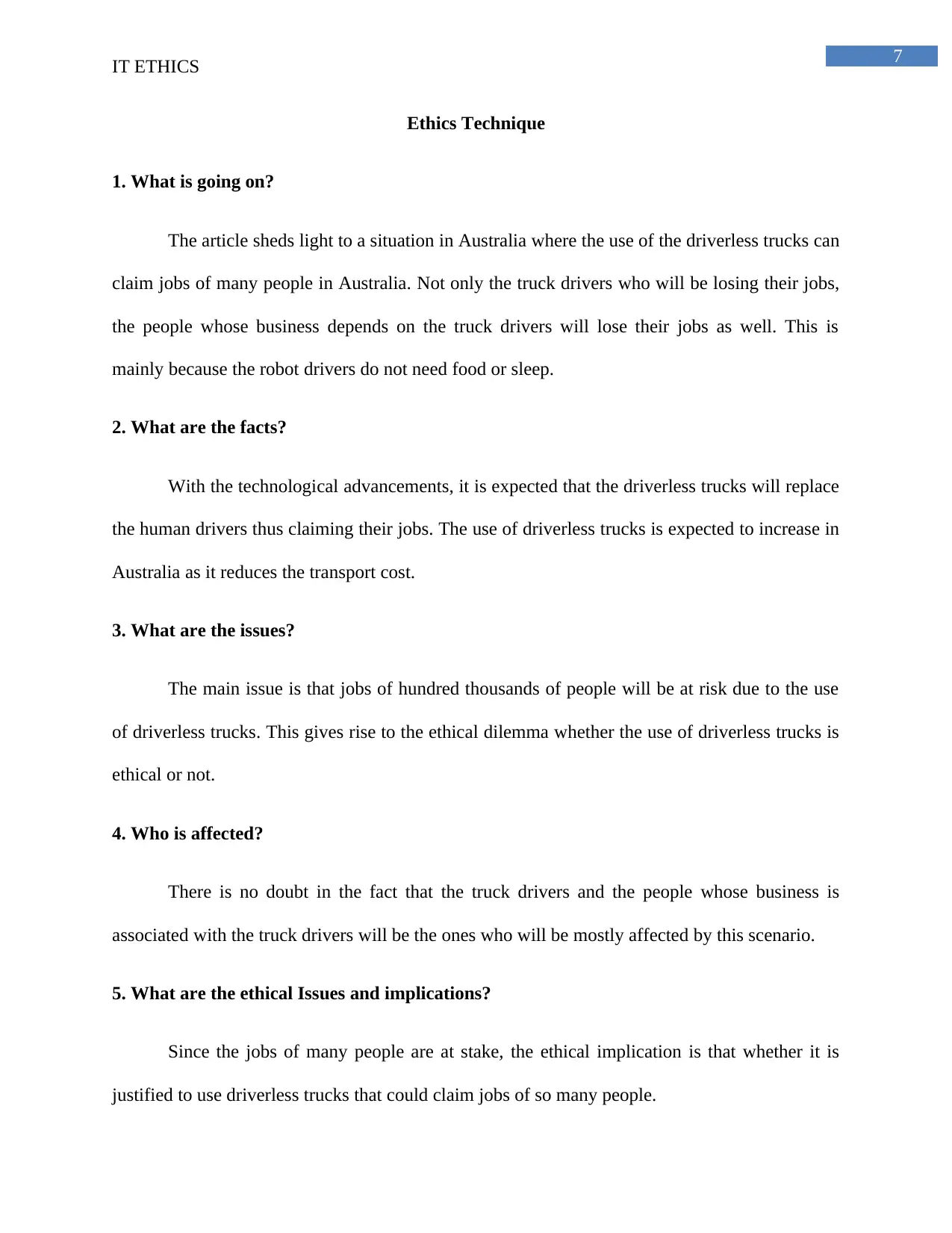
7
IT ETHICS
Ethics Technique
1. What is going on?
The article sheds light to a situation in Australia where the use of the driverless trucks can
claim jobs of many people in Australia. Not only the truck drivers who will be losing their jobs,
the people whose business depends on the truck drivers will lose their jobs as well. This is
mainly because the robot drivers do not need food or sleep.
2. What are the facts?
With the technological advancements, it is expected that the driverless trucks will replace
the human drivers thus claiming their jobs. The use of driverless trucks is expected to increase in
Australia as it reduces the transport cost.
3. What are the issues?
The main issue is that jobs of hundred thousands of people will be at risk due to the use
of driverless trucks. This gives rise to the ethical dilemma whether the use of driverless trucks is
ethical or not.
4. Who is affected?
There is no doubt in the fact that the truck drivers and the people whose business is
associated with the truck drivers will be the ones who will be mostly affected by this scenario.
5. What are the ethical Issues and implications?
Since the jobs of many people are at stake, the ethical implication is that whether it is
justified to use driverless trucks that could claim jobs of so many people.
IT ETHICS
Ethics Technique
1. What is going on?
The article sheds light to a situation in Australia where the use of the driverless trucks can
claim jobs of many people in Australia. Not only the truck drivers who will be losing their jobs,
the people whose business depends on the truck drivers will lose their jobs as well. This is
mainly because the robot drivers do not need food or sleep.
2. What are the facts?
With the technological advancements, it is expected that the driverless trucks will replace
the human drivers thus claiming their jobs. The use of driverless trucks is expected to increase in
Australia as it reduces the transport cost.
3. What are the issues?
The main issue is that jobs of hundred thousands of people will be at risk due to the use
of driverless trucks. This gives rise to the ethical dilemma whether the use of driverless trucks is
ethical or not.
4. Who is affected?
There is no doubt in the fact that the truck drivers and the people whose business is
associated with the truck drivers will be the ones who will be mostly affected by this scenario.
5. What are the ethical Issues and implications?
Since the jobs of many people are at stake, the ethical implication is that whether it is
justified to use driverless trucks that could claim jobs of so many people.
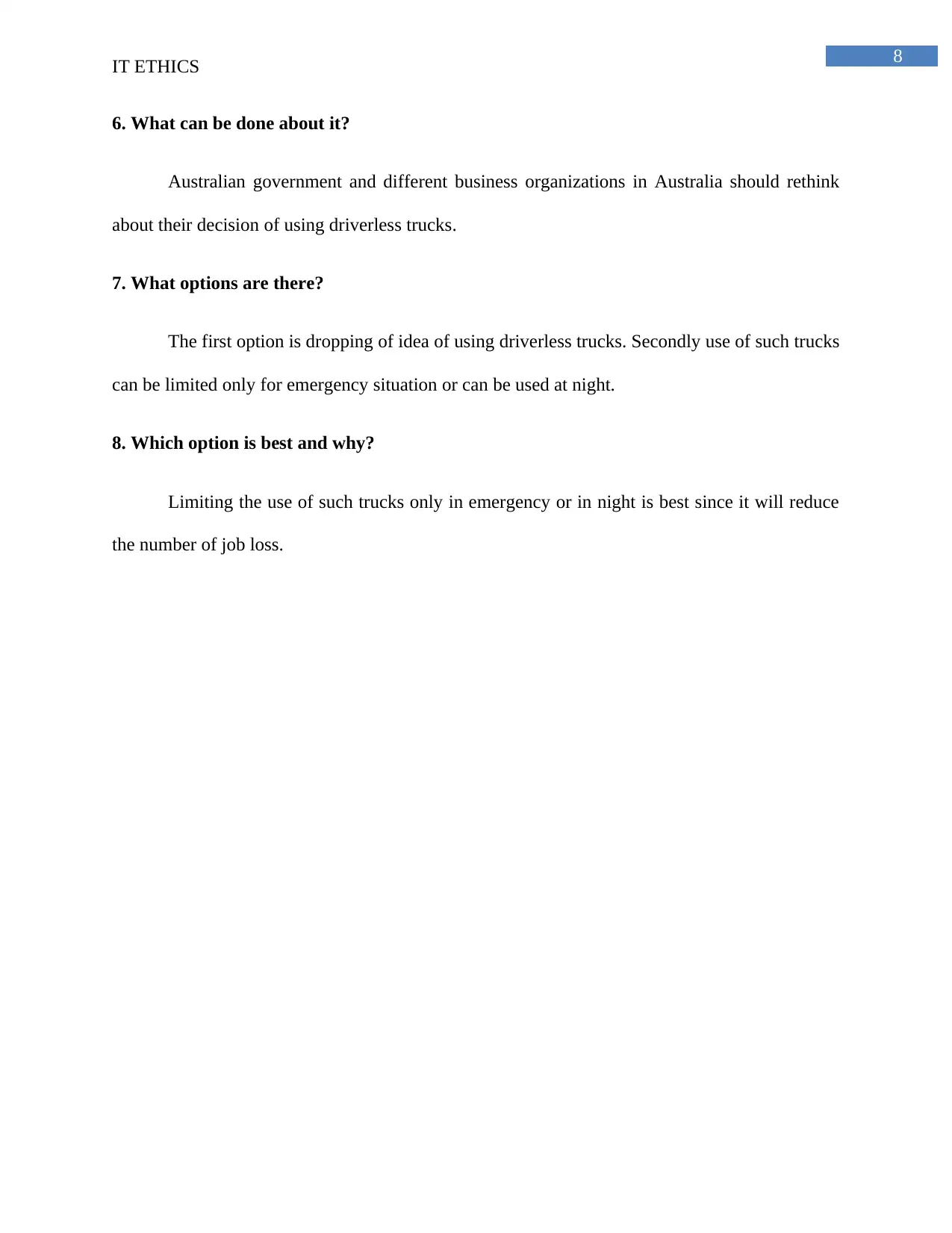
8
IT ETHICS
6. What can be done about it?
Australian government and different business organizations in Australia should rethink
about their decision of using driverless trucks.
7. What options are there?
The first option is dropping of idea of using driverless trucks. Secondly use of such trucks
can be limited only for emergency situation or can be used at night.
8. Which option is best and why?
Limiting the use of such trucks only in emergency or in night is best since it will reduce
the number of job loss.
IT ETHICS
6. What can be done about it?
Australian government and different business organizations in Australia should rethink
about their decision of using driverless trucks.
7. What options are there?
The first option is dropping of idea of using driverless trucks. Secondly use of such trucks
can be limited only for emergency situation or can be used at night.
8. Which option is best and why?
Limiting the use of such trucks only in emergency or in night is best since it will reduce
the number of job loss.
⊘ This is a preview!⊘
Do you want full access?
Subscribe today to unlock all pages.

Trusted by 1+ million students worldwide
1 out of 9
Related Documents
Your All-in-One AI-Powered Toolkit for Academic Success.
+13062052269
info@desklib.com
Available 24*7 on WhatsApp / Email
![[object Object]](/_next/static/media/star-bottom.7253800d.svg)
Unlock your academic potential
Copyright © 2020–2026 A2Z Services. All Rights Reserved. Developed and managed by ZUCOL.





